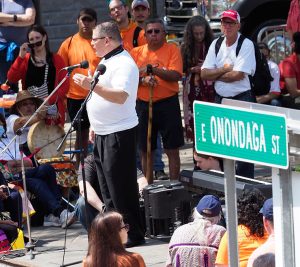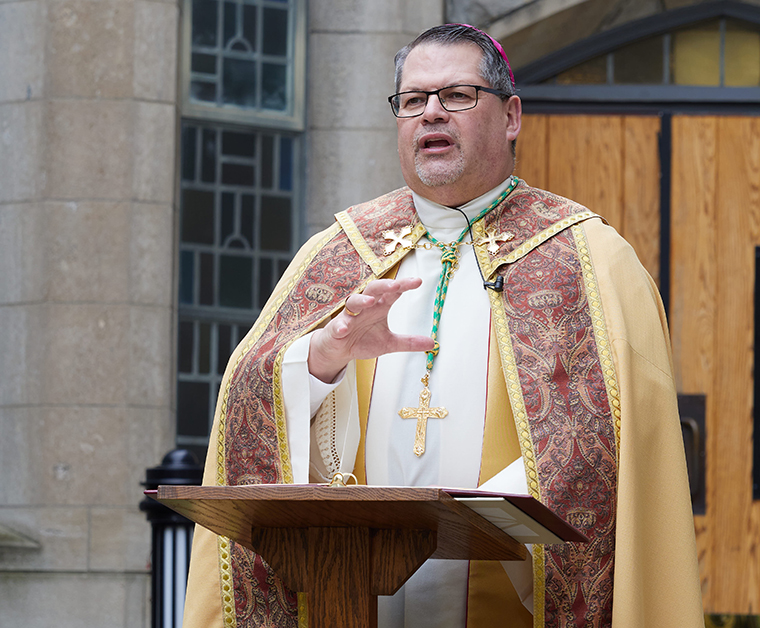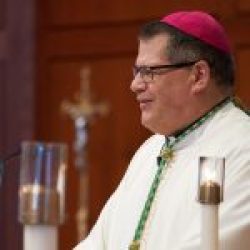Bishop Lucia is looking ahead as he celebrates his 3rd Anniversary
“In the Name of Jesus” is the guiding motto that Bishop Douglas J. Lucia adopted when he was ordained and installed as the 11th bishop of the Diocese of Syracuse on August 8th, 2019. Bishop Lucia met with The Catholic Sun this past week for a look back at his time in Syracuse and to talk about his future dreams and plans for the diocese.
This is Part 1 of the interview; Part 2 will be included in our August 18 edition.
Sun: We’ll begin with a look back at the interview you did with The Catholic Sun last year, on your second anniversary. You remarked that you were looking forward to moving on from the effects of Covid-19 on our diocesan functions. One year later, Covid is still here. How has this past year compared to your first two against that backdrop?
BISHOP: Actually, the past year has felt a lot more – if I can use the word – normal. It’s been a lot more normal in that we have had more in-person meetings, I’ve been out to the parishes more, that kind of thing, especially with the (synodal) listening sessions. It was more normal in the sense that I could be out there among the people.
SUN: Speaking of the listening sessions, what you have learned in this process has recently been published and delivered to the regional synod committee (Editor’s note: the report is available at thecatholicsun.com). Can you tell us what the experience was like for you, having attended all forty-two sessions?

Bishop Douglas J. Lucia speaks at the rally following the walk for indigenous people. (Sun Archives)
BISHOP: It was very interesting to me, as I’ve said to people many times in the last few years, that when I became a bishop I came from being a parish priest and I really didn’t have any model of what this was supposed to be like. The only model I had in mind was that I was going to be a pastor, but of a diocese, of a bigger parish. One of the things I always tried to do in parish life was to reach consensus, and I realized that requires a lot of listening. The big thing for me, and it was under the auspices of synodal planning, was being able to get out there and to listen to the people, to hear what they had to say. I liked what Sr Katie (Sr Katie Eiffe, director of synodal planning) would say to those attending: ‘Speak freely, speak boldly, speak courageously, but speak respectfully.’ For me, that was most important: that people could say what they needed to say to me. And they weren’t necessarily looking for answers; they wanted to express their frustrations, their disappointments, their joys, their sorrows. Whatever it might be. For me, that was a great lesson; it was very humbling. I know I was asked on more than one occasion if I was tired when I got home, being out late so many nights during the week. Actually, sometimes I was exhilarated that people were willing to share where they’d like to see the Church go, and the idea that they weren’t expecting answers. That’s the big thing now, now that they have spoken, what’s going to happen? What has come up at the synod sessions, we do need to address. It was interesting in that, with one group I met with, they were saying ‘We have to do all of this right now!’ I remember saying to someone there that ‘We have to remember…the Church has been around two-thousand years…we are still working at it. We can’t keep kicking the can down the road, but we also can’t snap our fingers and make everything change. I love Jesus’ imagery in the Gospel of John when he talks about a woman in labor, in the sense that we are laboring. There will come a moment when we’ll be rejoicing that the labor will bear fruit. Right now, we are still in the labor process.
SUN: Sr. Katie does remind people to speak boldly but to speak respectfully. Do you find today that there is as much respect in conversations between a priest or bishop and their congregation now, as there was when you were first ordained?
BISHOP: There has been a change, there is no doubt about it. I think going back thirty-three years ago, so many of us thought that we had it made, in one way, that we were doing God’s mission and could do it through our seminaries, our youth groups, our parishes. At that point, our numbers were greater, and we thought that, okay, we can just keep this ship going. But in the church and in society, I believe we discovered, though, that it takes work…it does require elbow grease when one is ordained, whether it’s as priest, deacon, or bishop, or when one makes the vows to consecrated life, or even in marriage. It is a work in progress. I think that’s hard for our society today, the way I describe it, and I see this in married couples, I see it in young priests. It’s a generational thing. In my parents’ generation, and in the way I was raised, you build things together. My parents built the family home that we lived in, but it was always a work in progress. Today, it’s not just the sacrament of Marriage, we see it even in the other sacraments. ‘When we have everything all together…when we have a house and everything all together, we’ll marry. We’ll have a baptism when we can have a party.’ In the priesthood…’when I have everything in order, then I’ll enter the seminary.’ I think that’s the difference today; there is a tendency to want everything ready-made. And if it’s not ready made, that’s where we see the crises coming from. Even in terms of employment right now, rather than people working up to something, they want it right now.
SUN: With that in mind, how difficult was it for you, in the synod sessions, to just listen and not respond?

Bishop Lucia greets his teammates at the start of the Men In Black baseball game. (Sun Archives)
BISHOP: It really wasn’t that hard, and I must admit that I thought it would be harder. I found it very beneficial. There were a couple times when things were being misspoken or their facts weren’t correct, and I wanted to intervene, but I held back. There were times, though, when someone would raise a question and I would say that ’it’s already being done.’ There were moments like that where I didn’t want people left hanging.
SUN: In 2019, when you were installed, you said in The Catholic Sun interview answering a question about your philosophy that you ‘are a pastor…I don’t see myself any different.’ Now, you are again a pastor, serving in that capacity at St. Margaret’s in Mattydale in addition to your role as bishop. How is that going?
BISHOP: I am trying to model what I hope could happen in other parishes, as I try to do my multi-tasking, if you want to call it that. I am really blessed with wonderful collaborators in ministry, Deacon Dave Losito, Christine (Marcuccio) and Patti (Phillips) in the office along with others who are so helpful in assisting me to, shall I say, steer the ship that we know as St. Margaret. It’s been a great blessing! I am amazed at how many people, and how many of my brother priests who say ‘If we can pitch in, if we can help you…’ Again, not being from the Diocese of Syracuse originally, it allows me to actually serve in one of the parishes and just get a sense of things, get a sense of the people and of parish life here in this diocese. I really do believe in this whole theme of accompaniment. I want people to know that there are different ways to accompany. It may still be a hope that if every parish could have a priest, or for a priest to have two smaller parishes assisted by other pastoral team members. But that’s just not the way it is these days. I am glad when people say that they feel they are being cared for. I want people to know, though, that just because a priest isn’t living at your worship site, it does not mean that the church is not present, and that the church’s mission doesn’t continue. Some of the more practical things is it helps me to get to know parish life. Is this too much in the life of a parish priest? Is there a way to help our priests? But also, to invite more people into leadership roles; these are all things that I look at right now as I pastor the people of St. Margaret’s.
SUN: In 2020, the Sun headline on your first anniversary story was “This is Home.” In 2021, it was “We are One Diocese.” What should your headline be for 2022? What’s foremost on your mind for the past year, the past three years and as you look forward?
BISHOP: In one way I’d like it to be ‘Forward, Ho!,’ how in movies we see a caravan of wagons moving on. That’s where, more than ever, we need to build our parishes into communities where all people feel they are welcomed. One of my greatest challenges, and it hasn’t been lost on me, is that we are still trying to address the issue of those who have suffered abuse at the hands of the church. Looking at the Pope’s meeting I am aware that I don’t want this to drag on. We need to come to a moment where reparation is actually made. I know that a lot of conversation goes around about the creation of the fund for the victims, but we need to come to a point where that gets done. People are in need of closure, in need of healing and they want to move on. The church has to do what it can to help with that movement forward. That’s my earnest prayer.
PART 2 of The Catholic Sun interview with Bishop Lucia will appear in the August 18th edition.
v







